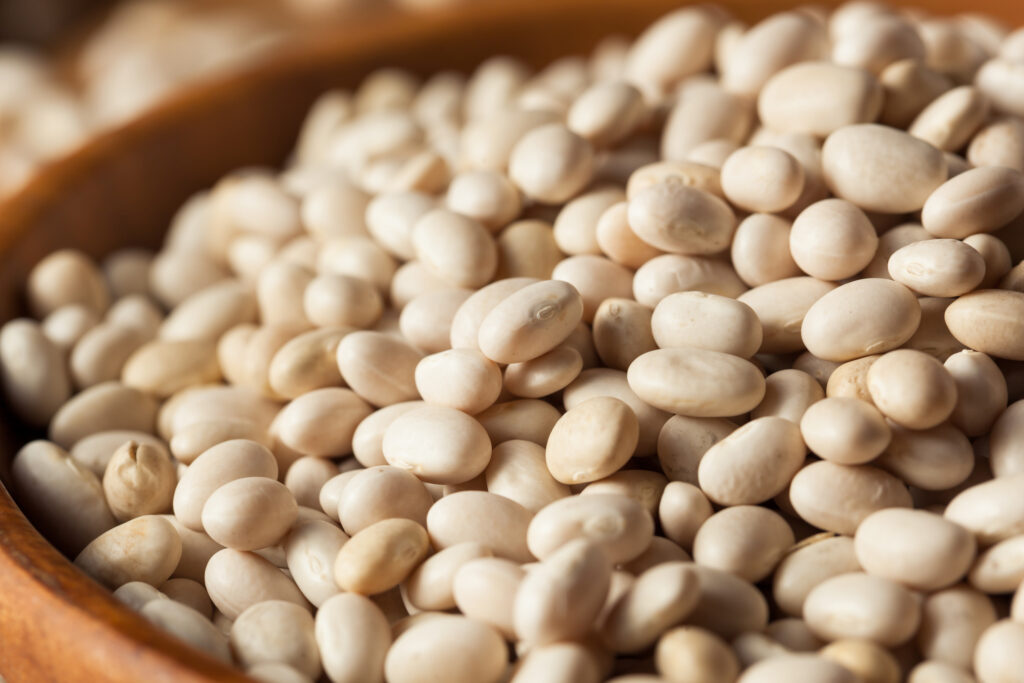Beans, beans, good for the…gut? They are. At least according to new research from the University of Texas MD Anderson Cancer Center.
Their study, which involved incorporating navy beans into the diets of colorectal cancer (CRC) survivors found that these common legumes have the potential to positively impact both gut and host health by modulating markers of obesity and disease. The results were published in the peer-reviewed journal eBioMedicine, which is part of The Lancet Group.
The Study
The randomized BE GONE trial followed 48 men and women over age 30 who qualified as obese due to body mass index (BMI) or waist size and who also had a history of bowel lesions. This included patients with a history of CRC (75 percent of participants) and/or high-risk, precancerous polyps of the colon or rectum detected at colonoscopy (25 percent). For eight weeks, participants followed either their regular diet or their regular diet plus one daily cup of organic, canned, pressure-cooked white navy beans.
Patients were allowed to choose and prepare their own meals, with close follow-up and counseling from a study dietitian. Every four weeks, participants provided stool and fasting blood samples to determine shifts in the gut microbiome and other markers. Participants who consumed at least 80 percent of the beans and followed the prescribed regimen at least five days a week during the trial period were considered adherent.
At the end of the eight-week study period, participants in the bean group who adhered to their diet saw positive changes in their gut microbiomes, including an increase of alpha diversity, or beneficial bacteria (Faecalibacterium, Eubacterium, and Bifidobacterium) and a decrease in pathogenic, or opportunistic, bacteria.
The navy bean group also showed improvements in other anti-inflammatory and immunologic biomarkers. “Our collective findings for beneficial microbes, PA [pipecolic acid], SAM [S-(5′-Adenosyl)-l-methionine] and trigonelline, and FGF [fibroblast growth factor]-19 demonstrate that the simple diet change and the bean “dose” was sufficient to influence host metabolites and biomarkers with potential therapeutic relevance,” the researchers wrote in their conclusion.
Conclusions
“Observing a shift in microbiome diversity with diet intervention alone is rare, and this study underscores the ability of a readily available prebiotic food to bring about such changes,” said Carrie Daniel-MacDougall, PhD, one of the study’s authors. “Over the course of eight weeks, there was an improvement in participants’ gut health, marked by an increase in beneficial bacteria, which wards off the harmful bacteria.”
The researchers noted that, along with the small sample size and relatively brief trial period, the study’s limitations include participant aversion to continually consuming navy beans. However, no serious side effects were reported. “The beans did not appear to induce gut inflammation or seriously impact bowel habits, which is crucial for CRC survivors and patients,” Daniel-MacDougall said. “However, once participants stopped eating the beans, the positive effects faded quickly, highlighting the need to educate patients on how to maintain healthy habits.”
Daniel-MacDougall cautions that individuals should not attempt this diet without speaking to a physician, as it could have negative impacts without proper guidance. Further study is needed in order to determine how dietary changes can be used to lower cancer risk or improve treatment outcomes.






